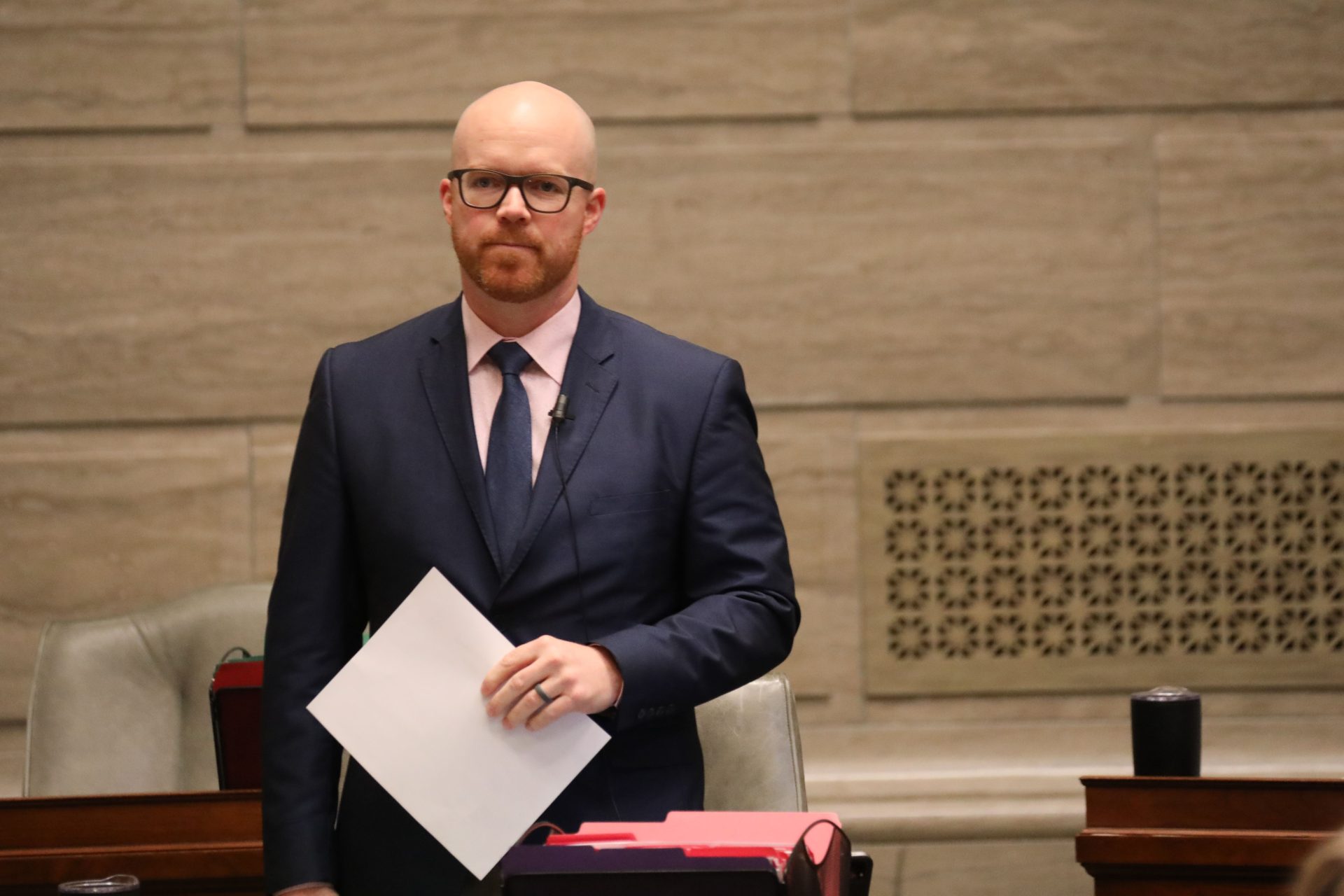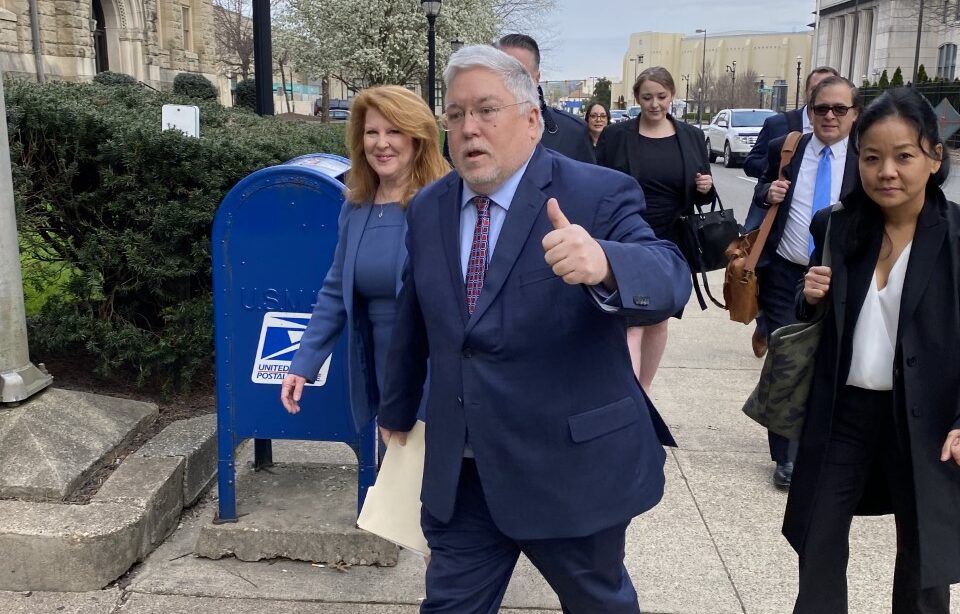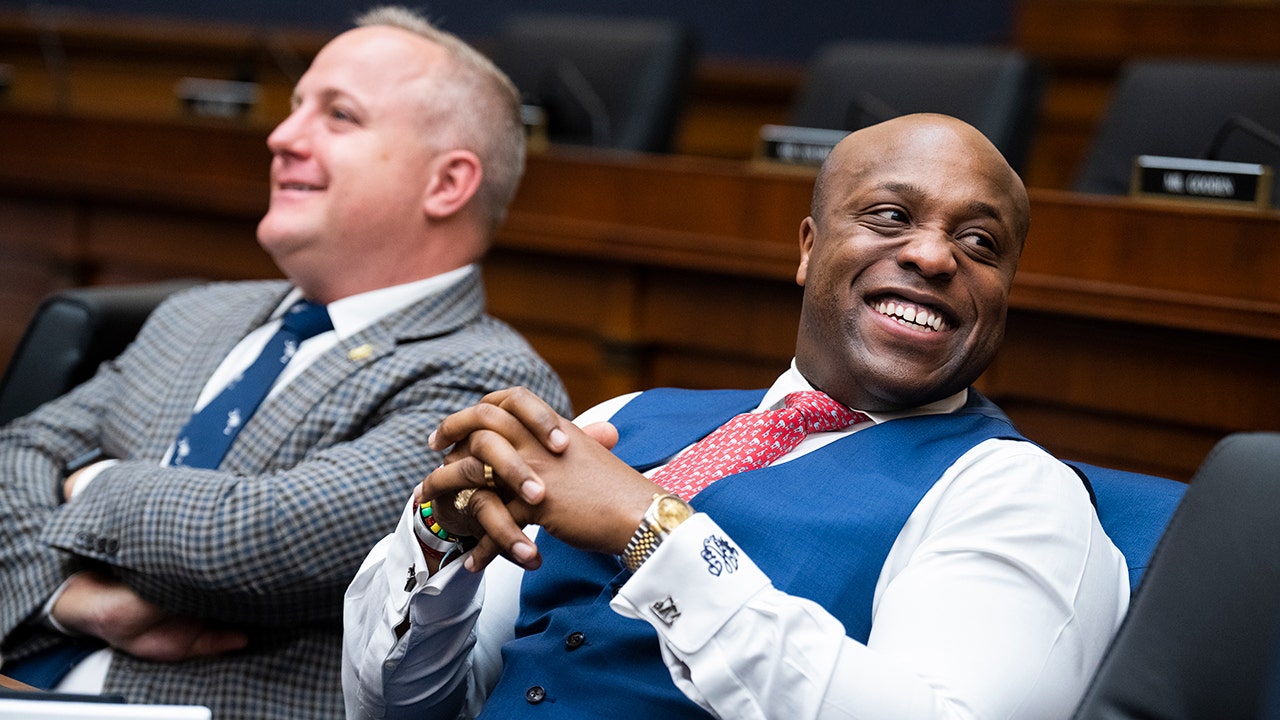Missouri’s nine Senate Democrats continue their round-the-clock filibuster at this hour in Jefferson City. They’re filibustering legislation they say would make it more difficult for voters to amend the state Constitution. Democrats began filibustering on Monday afternoon. Initiative petitions in Missouri currently need a simple majority statewide to pass. The GOP-controlled Missouri House has passed legislation that would require future proposed constitutional amendments to be approved by voters statewide and in five of Missouri’s eight congressional districts. The GOP-controlled House has added language that would ask voters to ban non-citizens from voting. There’s also a provision involving foreign entities and elections. Democrats don’t like the added language, saying federal law already prohibits this. The filibuster began Monday afternoon. State Sen. Travis Fitzwater (R-Holts Summit) joined us live on 939 the Eagle’s “Wake Up Mid-Missouri” to discuss the filibuster. Senator Fitzwater tells listeners he’s been in constant contact with Senate Majority Leader Cindy O’Laughlin (R-Shelbina), adding that he doesn’t have any great prediction about what will happen. Senator Fitzwater says he wants to see a path forward. He describes the state Constitution as a sacred document and says making changes to it should require a higher threshold. He also supports the idea of the two provisions added by House Republicans. The key question is where Leader O’Laughlin will call the previous question at some point, which would cut off debate. Senator Fitzwater tells listeners there’s been some discussion on that. The filibuster continues now, and the Democrats are controlling the Senate floor:
Missouri
Missouri bill would loosen child labor law by removing work permit requirements • Missouri Independent

A push to eliminate Missouri’s requirement for children under 16 to obtain official work permits before they can begin a job could be debated by the House this week.
In order to work in Missouri, 14 and 15 year olds must obtain a certificate issued by their school, with information from their prospective employer about the details of the job as well as parental consent and age verification.
The child’s school, or if they are homeschooled, a parent, must review that information to ensure it’s in line with state laws that restrict the kind of work children can do and their hours. Once the school issues the certificate, a copy is filed with the Missouri Department of Labor and Industrial Relations.
Children under 14 are generally not permitted to work and those 16 and older aren’t subject to the same restrictions.
The bill, sponsored by Republican state Rep. Dave Hinman of O’Fallon and a similar one sponsored by state Sen. Nick Schroer of Defiance, would eliminate the formal work permit process. Instead of being overseen by schools and the state labor agency, the only requirement would be that a parent sign a permission slip for the child’s employer.
Proponents have characterized schools’ role in the process as unnecessary and outdated, and said parents should have the largest role.
“With discussions with our superintendent and other folks around here,” Hinman said in an interview with The Independent this week, “we felt it was better that the parents make that decision instead of schools being the ones that sign off on it.”
Hinman’s bill was voted out of committee in March, and he hopes the full House will debate it before session ends — perhaps as early as this week. The Senate version of the bill was heard in committee earlier this month and hasn’t been voted out yet.
The bill is about “empowering employers and youth,” Schroer said in a committee hearing earlier this month.
“While easing the regulations, this legislation also prioritizes parental involvement by mandating signed permission slips…ensuring that parents are informed and involved in their child’s work activities” Schroer said.
Arkansas passed a similar law last year eliminating youth employment permits, though it didn’t include the parental permission slip piece. It faced opposition from child advocacy groups and others, who worried it would remove a layer of oversight protecting child workers in a time when child labor violations have gained attention nationally for being on the rise.
Proponents have insisted that the bill won’t affect child labor violations because businesses will still be required to comply with state and federal law.
In Missouri, the legislation has flown largely under the radar: No one testified in opposition during hearings on the bill the last two years. A handful of individuals submitted written opposition.
John Fliter, an associate professor of political science at Kansas State University, who studies child labor, said in an interview with The Independent that certificates are an important safeguard for children.
“We need to be careful because at the same time that [some states are] doing this, weakening restrictions, we’re seeing an increase in child labor violations and some really bad cases over the last few years,” he said.
The certificates, Fliter added, produce a record of employers acknowledging they will follow the law, and allow schools to play a “supervisory role” and ensure children are “not working to the detriment of their education.”
State Sen. Doug Beck, a Democrat from Affton, asked during a committee hearing earlier this month how the state could be sure employers were still doing things like age verification if the government wouldn’t be allowed to require permits to oversee the process.
“Where’s the enforcement on this bill exactly?” Beck asked. “…Where’s the accountability?”
“I think the accountability is with the parents and the business owners,” Schroer replied.
Schools’ role

Earlier versions of the House bill included language to extend the hours in the day children are allowed to work, but that’s since been removed because the sponsor found out it conflicts with federal law.
Children under 16 are legally required to be off work by 7 p.m. during the school year.
The reason Hinman initially filed the bill was because he wanted to push that time back, after he was approached by a restaurant owner in his district who was struggling with staffing those later hours.
“I’d like to see that time adjusted hopefully, up till eight o’clock, nine o’clock. Just to give a little bit more time for those businesses,” he said.
Now, the bill includes a provision that those restrictions apply “unless a later time is allowed by federal law,” which Hinman said is intended so Missouri can automatically change its law if the federal government does.
When he started looking into these laws, Hinman found it “an odd thing that the school district did that,” referring to the certification requirements, which led him to look at a bill filed last year and incorporate some of its language.
Youth work permits aren’t federally mandated but the majority of states require them.
Thirty-four states require youth work permits. The details vary, including whether they’re issued by a state agency or schools and what ages are included.
State Rep. Holly Jones, a Republican from Eureka, said in the committee hearing that she “hates” that schools are the ones who sign off on certificates.
“I really don’t love the schools having so much power over families and students,” she said.
A similar bill last year, sponsored by Sen. Andrew Koenig, a Manchester Republican, didn’t gain momentum, clearing a Senate committee but never being debated by the full chamber.
A Washington Post investigation last year found the Florida-based conservative think tank, Foundation for Government Accountability, and its lobbying arm, the Opportunity Solutions Project, has been behind the push to roll back certain child labor protections in state legislatures.
“States should be allowing their teenagers to decide, with their parents, to get a job — not the government,” an issue paper published by Foundation for Government Accountability last year said. The paper characterized the issue as pitting “parents vs. educators and regulators.”
That group played an important role in Arkansas’ elimination of work certificates, the Post reported, and in Missouri, a lobbyist for Opportunity Solutions Project, James Harris, sent Koenig’s staff draft legislation last year before he filed it. Hinman said Harris didn’t approach him with the language.
Harris was the first one to testify in the committee hearings this year. In the House hearing, he said his first job as a teen helped him when he was a “law breaker” youth.
“I look back at that job and I learned so much,” Harris said.
“…Part of this is to help businesses be able to have more of a workforce for people to work,” Harris said during a later discussion about how pushing back the 7 p.m. restriction could cause businesses to worry about breaking federal law and not bolster their workforce.
Neither Harris nor the Foundation for Government Accountability responded to interview requests.
Other support has come from business groups including the Missouri Chamber of Commerce, Missouri Retailers and Missouri Grocers Association.
The legislation was voted out of committee on party lines. Democrats opposed it.
Hinson said in an interview with The Independent that while he’s not optimistic it will pass this year — with just three weeks left in session — he is hopeful it will come to the floor and that discussion will help improve the bill for next year.
“I would love to have the opportunity to have a full discussion with everybody on the floor, both sides of the aisle and see what the thoughts are so next year if we need to make corrections to the bill, that we can make it an even better bill,” Hinman said. “…[The legislation] is one of my priorities.”
‘One more set of eyes’
Maura Browning, spokesperson for Missouri’s Department of Labor and Industrial Relations said the agency can’t comment on pending legislation.
But speaking broadly about how the state oversees child work requirements, labor department officials said they rely on the current licensing practice and see it as a tool to help ensure kids don’t enter hazardous work or take on excessive hours.
The required form is just one page. In it, the child’s prospective employer must provide the specific job duties, hours and an acknowledgment they will abide by state law. Schools verify a child’s age and can review their grades.
Todd Smith, who directs the Division of Labor Standards within the state labor department, said schools help identify when the descriptions employers submit should be flagged as hazardous.
Kids under 16 aren’t allowed to do certain jobs, like operating a meat slicer or handling any hot oil or grease.
“We will enforce whatever the legislature passes, obviously, but in a perfect world, I think it’s important to have that education piece to share with employers,” Smith said in an interview with The Independent.
Missouri issued over 10,000 youth employment licenses last year.
Patrick Watkins, who works as the wage and hour section manager in the state labor department, said going through the school “gives us one more set of eyes to look at those hazardous job descriptions.”
Watkins added that in the current process the employer “agrees that they understand our restrictions, but more importantly, they have to fill in exactly what job duties the child will be performing and we catch a lot of hazardous titles just in that reveal alone.”
Child advocacy and social justice organizations reached by The Independent said they are not taking a position on the bill because they are deciding to stay out of the issue or are simply not up to speed on the legislation.

Missouri
‘Serial Child Rapist’ Nabbed in Missouri After 24 Years on the Run: Feds

An Illinois man labeled a “serial rapist” by authorities was arrested over the weekend in Missouri after more than two decades spent on the lam.
Herman Carroll, 72, was taken into custody in the Ozark town of Branson by U.S. Marshals on Saturday, they said.
After being accused of sexually assaulting a 12-year-old girl in 2000, he posted bail and vanished. A warrant was issued for his arrest the following year after he failed to appear at a hearing in the case. He was charged with predatory criminal sexual assault of a child, criminal sexual assault and aggravated criminal sexual abuse, federal agents said.
Carroll had previously been convicted of sex offenses against children in 1983 and 1993, according to the Marshals.
A sprawling investigation into his disappearance involved multiple agencies and extended across more than a dozen local, state, and federal jurisdictions, including six states: Missouri, Illinois, Texas, Alaska, Arkansas and Maryland. Last week, two fugitive task forces searching for him received a tip that he was likely in Branson, officials said.
Carroll was on Wednesday being held in the Taney County Jail awaiting extradition proceedings in Illinois, according to online records.
“Sometimes, law breakers believe that Branson may be an ‘easy mark’ to either victimize our residents and tourists, or they think they can safely hide out here,” a Facebook post from the Branson Police Department celebrating Carroll’s arrest said. “Nothing could be farther from the truth!”
Missouri
(LISTEN): State Sen. Travis Fitzwater (R-Holts Summit) discusses Senate filibuster on “Wake Up Mid-Missouri” | 93.9 The Eagle

State Sen. Travis Fitzwater (R-Holts Summit) speaks on the Missouri Senate floor in Jefferson City on March 23, 2023 (file photo courtesy of Dean Morgan at Senate Communications)
15 mins ago
KWOS, Mid-Missouri News, post to twitter
Missouri
Missouri State alumna, plant and soil expert, named dean of Darr College of Agriculture

At the May meeting of Missouri State University’s Board of Governors, Melissa Bledsoe was officially announced as the dean of the Darr College of Agriculture.
She’d been serving as the interim for more than a year.
Provost John Jasinski made the introduction, noting many of Bledsoe’s accomplishments.
“Melissa has been recognized in the state of Missouri, nationally and internationally, for her work,” he told the MSU board at the May 9 meeting. “She’s had great mentors, lots of external partnerships with the Missouri Department of Agriculture — working with Silver Dollar City right now, Convoy of Hope — continues to teach and mentor and guide.”
Jasinski pointed out that the expert in plant physiology and nutrition had obtained several grants and presented research nationally and internationally.
Bledsoe earned a bachelor’s degree in horticulture and a master’s degree in plant science from Missouri State and then a doctorate in plant, insect and microbial sciences from the University of Missouri.
After working at MU’s division of plant sciences from 2010-13, she was hired as an assistant professor at Missouri State and then promoted to an associate professor.
Bledsoe is currently an endowed professor through the Clif and Gail Smart Professor in Agriculture award. She was also named the interim dean in 2023.
“Dr. Bledsoe is the right choice to lead the Darr College of Agriculture as it continues to evolve, offering unique ‘farm-to-fork’ curriculum and learning experiences,” Jasinski said in a news release announcing Bledsoe was the permanent dean, starting May 1.
“Her student-focused, team-oriented and results-driven approach — combined with her understanding of changing internal needs and external expectations — will serve the college well for years to come.”
More: New pact outlines roles, responsibilities of Missouri State and MSU Foundation
The structure of the Darr College of Agriculture changed as part of the university’s recent academic realignment, taking hospitality leadership under its umbrella.
“The momentum of the Darr College of Agriculture is fueled by many opportunities on the horizon. I look forward to working with colleagues and the ag community to develop our programs to support the agriculture industry,” said Bledsoe, in the release. “It’s all for our students to learn, grow, and lead the future of agriculture.”
-

 Politics1 week ago
Politics1 week agoHouse Dems seeking re-election seemingly reverse course, call on Biden to 'bring order to the southern border'
-

 World1 week ago
World1 week agoStand-in Jose Raul Mulino wins Panama presidential race
-

 News1 week ago
News1 week agoCompass Direct LLC’s 2024 Registration in North Carolina
-
News1 week ago
UCLA to resume in-person classes after Gaza protest crackdown
-

 World1 week ago
World1 week agoTech compliance reports, Newsletter
-

 News1 week ago
News1 week agoColumbia University cancels its main commencement ceremony after weeks of turmoil
-

 News1 week ago
News1 week agoMan, 75, confesses to killing wife in hospital because he couldn’t afford her care, court documents say
-

 World1 week ago
World1 week agoPentagon chief confirms US pause on weapons shipment to Israel




















